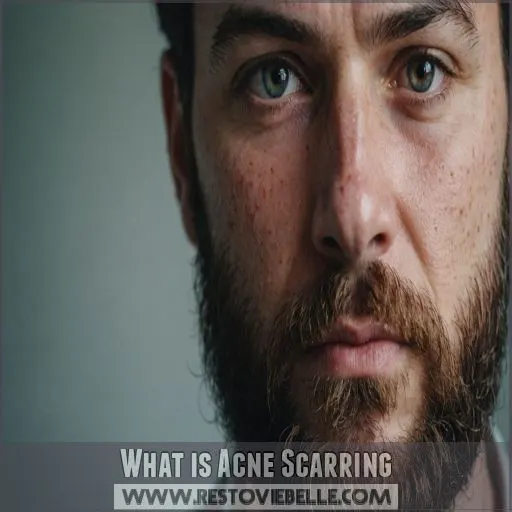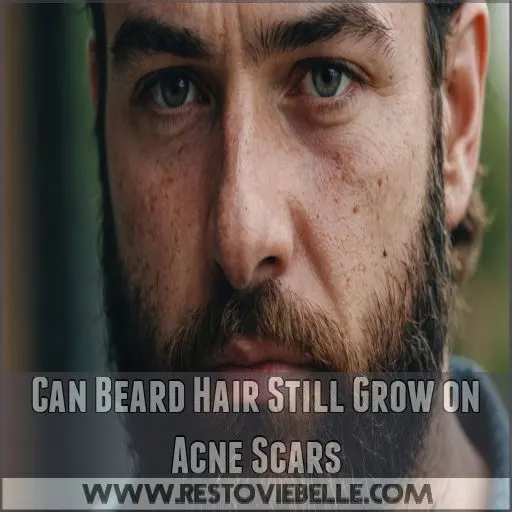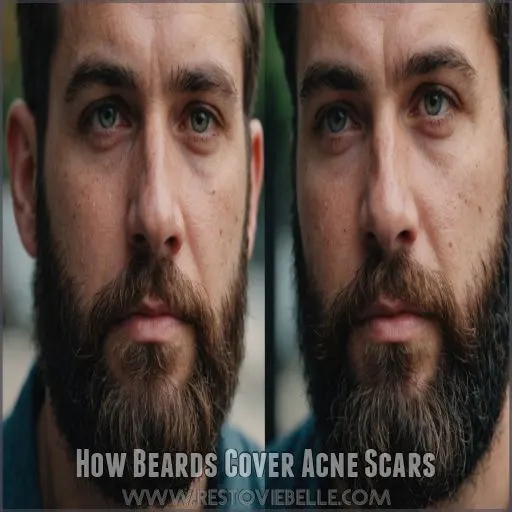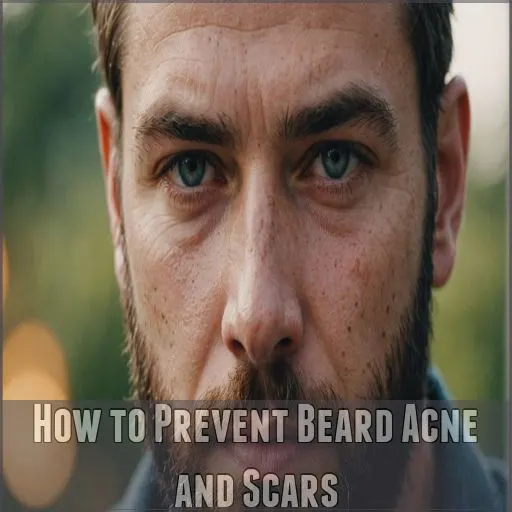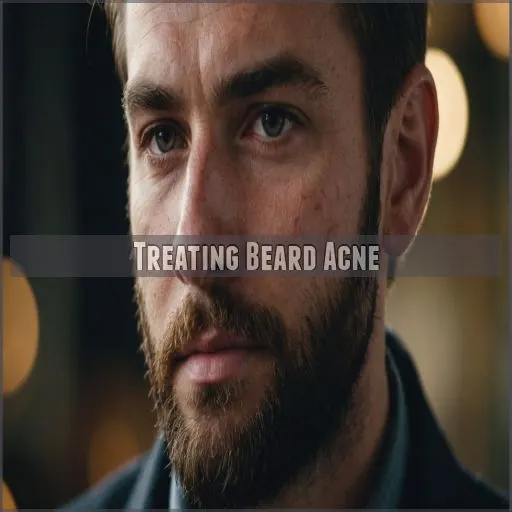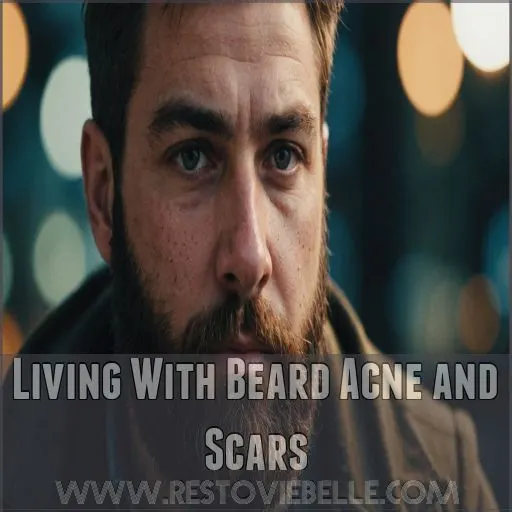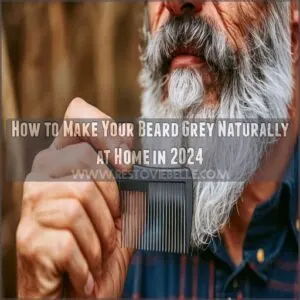This site is supported by our readers. We may earn a commission, at no cost to you, if you purchase through links.
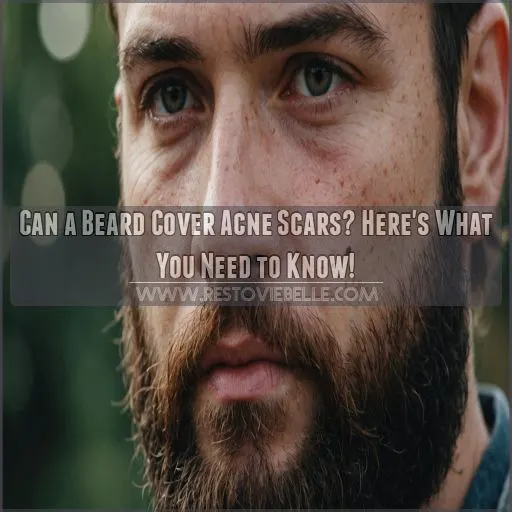
If your scars are mild, a thicker beard can work wonders, acting as a natural camouflage. Think of it as Mother Nature’s concealer—who knew facial hair had a secret identity?
But if scarring is more severe, you might find some areas sparse. Even then, longer styles or using hair fibers can help cover gaps.
So, while it’s not an invisibility cloak, a well-groomed beard might just give you that extra boost of confidence. Curious about styling tips? Read on!
Table Of Contents
- Key Takeaways
- Can a Beard Cover Acne Scars
- What is Acne Scarring
- Options for Growing a Beard With Acne Scars
- Can Beard Hair Still Grow on Acne Scars
- How Beards Cover Acne Scars
- How to Prevent Beard Acne and Scars
- Treating Beard Acne
- Living With Beard Acne and Scars
- Frequently Asked Questions (FAQs)
- Can you grow a longer beard to cover up acne scarring?
- How do you get rid of acne scars?
- Do beards prevent acne?
- Is beard acne a bad thing?
- Will a beard grow over an acne scar?
- Does facial hair hide acne?
- How can I hide my acne scars?
- Will facial hair grow over a scar?
- What treatments reduce beard area acne scars?
- Can laser therapy help with beard scars?
- What role do androgens play in beard acne?
- Is microneedling effective for facial acne scars?
- How does collagen impact acne scar healing?
- Conclusion
Key Takeaways
- Growing a beard to cover acne scars is like nature’s concealer, providing a natural camouflage that boosts your confidence. While it is not an invisibility cloak, it can cleverly mask imperfections and leave you feeling more self-assured.
- Acne scars might affect beard growth, with more severe scars leading to patchy growth due to follicle damage. However, do not fret—consider longer beard styles, follicular unit grafting, or using hair fibers for extra coverage.
- Maintaining good skin health is crucial for both acne prevention and beard growth. Keep your beard clean and your skin exfoliated, and avoid using heavy, pore-clogging products. Non-comedogenic beard oils are your best friends.
- Embrace your beard’s unique look, even if it is a bit patchy. Confidence is your best accessory, and a well-styled beard can turn those pesky scars into mere whispers of the past, telling a story of resilience and self-love.
Can a Beard Cover Acne Scars
Wondering if a beard can take the spotlight off your acne scars?
It sure can—think of it as nature’s way of adding a little camouflage to your face.
but it’s important to understand how scarring might influence your beard growth.
How Acne Scarring Affects Beard Growth
Acne scars can affect your beard growth, but don’t let it ruffle your feathers. Hair might struggle over scar tissue due to follicle damage.
- Choose beard styles that cover imperfections.
- Consider scarring treatment options.
- Try beard oils to boost growth, like those found in the Melanin Kings Beard Care Kit
.
- Embrace your unique patchiness.
- Remember, we’re all a little rough around the edges!
Impact of Severe Acne Scarring on Beard Hair
Severe acne scarring can really impact beard hair growth. Deep, pitted scars may damage follicles, leading to patchy or uneven beard growth (Source).
However, with the right treatment options like follicular unit grafting , you can minimize the appearance of scars and cultivate a fuller, more uniform beard.
Can Mild Acne Scarring Affect Beard Growth
Wondering if those acne scars might throw a wrench in your beard-growing plans? Don’t fret! Mild scarring typically won’t hinder beard growth.
Your beard’s journey is all about follicle health and scarring severity.
While scars mightn’t stop growth, they can affect hair density in specific areas.
Keep your skin and follicles healthy, and your beard should flourish.
What is Acne Scarring
Acne scarring happens when stubborn breakouts leave behind marks that remind you of those teenage years you wish to forget.
While some scars might test your patience, understanding the types and causes can help prevent future marks, saving your future self a little grief.
Types of Acne Scars
When examining your skin for acne scars with a mirror, you might notice their diverse appearances—think of them as the unique imprints left by past battles.
Atrophic scars fall into boxcar, ice pick, and rolling types. Meanwhile, hypertrophic scars rise like tiny molehills.
Each type affects your skin differently, potentially influencing beard growth. Consult a dermatologist for treatment options.
Causes of Acne Scarring
While genetics play a part, acne scars often form due to inflammation, hormonal changes, or certain skin care habits.
Think of it like this: when acne spots burst or get picked, three main things can happen—1) risk factors increase, 2) clogged pores worsen, and 3) hair follicles get agitated.
This scarring isn’t necessarily a life sentence, though, and it’s often related to inflammation.
How to Prevent Acne Scarring
Prevention starts with understanding: acne scars form when the dermis is damaged.
Think of your skin as a delicate masterpiece—say no to picking!
Keep inflammation at bay with a soothing skincare routine and consult your dermatologist for personalized advice.
Remember, some genetic factors might make you prone, but mindful care can improve your skin’s story.
Treat Acne as Soon as It Develops
Jumping on acne like it’s the last chopper out of Nam is your best bet for dodging scars.
Be swift, like an action hero, applying early treatments to prevent scarring. Do this, and you’ll sidestep those pesky ‘ice pick‘ scars.
Consult a dermatologist for severe cases, and don’t forget, a healthy skin routine is your trusty sidekick.
Reduce Inflammation and Seek Treatment
Tackling acne-related inflammation is key to preventing scarring.
Seek professional help from a dermatologist, who can prescribe medications to reduce redness and swelling.
Vitamin C serums and microneedling treatments can also stimulate collagen production, helping minimize the appearance of existing scars.
Be patient – it may take several months to see results.
Avoid Picking Pimples
You know that urge to pick at pimples? It’s like a moth to a flame.
But attacking those bumps can lead to picking scars and a face resembling a battlefield.
Instead, give love to your skin’s natural healing process. Understanding pimple picking triggers is half the battle.
Ditching these habits will help you show your skin some respect.
Avoid Picking While Healing
Ever notice how picking at scars feels oddly satisfying?
Picking habits can slow the healing process and increase scarring risks. Instead, let your skin heal naturally.
Imagine your skin’s a garden needing time to bloom—your hands are the pesky weeds. Resist the urge to meddle.
Options for Growing a Beard With Acne Scars
If you’re wondering how to grow a beard even with acne scars, you’re not alone—plenty of folks have found clever solutions.
Growing a longer beard to cover up those tricky spots is one approach. You might also consider follicular unit grafting or using hair fibers to add thickness and camouflage any hard-to-cover areas.
Grow a Longer Beard to Cover Scarring
When your beard gains length and density, it might just become your best ally.
Beard style and care, including proper grooming and filling in patches, can turn your facial hair into a natural mask, hiding imperfections a 3-5 word contextual phrase
.
This stylish cloak blends seamlessly over various scar depths.
Embrace the freedom to redefine your look!
Consider Follicular Unit Grafting
If you’ve got acne scars throwing a wrench in your beard-growing plans, consider follicular unit grafting.
This process is akin to planting a tree in your face’s landscape. It offers a customized approach to enhance beard density.
Skilled surgeons carefully transplant hair follicles, ensuring natural growth patterns.
While costs can vary, the results often provide newfound confidence and camouflage.
Use Hair Fibres to Thicken the Beard
Hair fibers can be a game-changer for filling in beard gaps, offering a quick fix without the fuss of a transplant.
Here’s how to apply them:
- Choose the right type; keratin-based is the best choice.
- Apply on dry skin to prevent clumping.
- Use a fixing spray for durability.
- Costs are generally affordable compared to other options.
Can Beard Hair Still Grow on Acne Scars
Acne scars don’t have to mean the end of your beard dreams.
The good news is that beard hair can still grow over acne scars.
Though the growth may be affected by the severity and location of the scarring.
Do Acne Scars Stop Facial Hair Growth
Growing a beard with acne scars is like facing a tricky challenge; it’s possible but requires understanding the obstacles.
Acne scars can impact beard growth, primarily through hair follicle damage, which might slow your beard growth rate.
Genetics and scarring determine the extent of impact, but scar treatment options and even hair transplants can offer a boost ,.
Can Beard Hair Grow Over Acne Scars
Beard hair can grow over acne scars, but it’s not always a walk in the park.
Much like trying to hike through a rocky path, the growth might be uneven and patchy depending on scar type and severity .
Embrace the journey with regular beard care and acne prevention techniques to improve appearance and boost your confidence.
Factors Affecting Beard Hair Growth on Scars
Wondering if those rugged acne scars can halt your beard’s march?
Well, it’s all about scarring depth, follicle damage, and hair growth rate.
Shallower scars may allow some hair growth, but deep ones? They might need a helping hand.
Consider treatment options like Follicular Unit Extraction (FUE) .
Treat your scars, and let your beard dreams bloom!
How Beards Cover Acne Scars
If you’re worried about acne scars ruining your facial flair, don’t fret; a beard can work wonders in camouflaging those imperfections.
Think of your facial hair as nature’s concealer, cleverly masking scars like beard bald spots while adding a touch of rugged charm
.
Can a Beard Hide Acne Scars
Ever wondered if facial fuzz can be your knight in shining armor against acne scars?
A well-grown beard might just do the trick, but consider combining it with face masks containing alpha hydroxy acids alpha hydroxy acids, which gently exfoliate dead skin cells, revealing a fresh complexion underneath.
Think of it as your personal coat of armor, shielding those pesky marks from prying eyes.
While severe scars could pose a challenge, you might find that a fuller beard, paired with the right beard oil or even hair transplants, offers both coverage and confidence.
How to Style a Beard to Cover Acne Scars
Got scars? A well-styled beard can be your secret ace, transforming those pesky marks into invisible tales of the past.
Choose a beard style that complements your face shape and scar locations. Consider fuller styles like a goatee or full beard to achieve scar camouflage.
Vary the length for added coverage, and remember: grooming keeps everything looking sharp. It’s all about playing to your strengths and embracing your unique look.
How to Prevent Beard Acne and Scars
Maintaining a healthy beard and skin is key to preventing beard acne and scarring.
By understanding the causes of beard acne and following simple grooming tips, you can keep your facial hair and complexion looking their best.
Understanding the Causes of Beard Acne
Beards can hide acne scars, but they can also create their own mischief! Beard acne often results from clogged pores and hair follicle inflammation due to poor beard hygiene and excess oil production.
To avoid these pesky pimples:
- Choose the right grooming tools to reduce irritation.
- Regularly cleanse your facial forest.
- Opt for non-comedogenic beard products.
How to Keep Your Beard and Skin Healthy
Keeping your beard and skin healthy is key to avoiding pesky breakouts.
Follow a regular beard care routine: wash your beard like you wash your hair, exfoliate your skin to avoid clogged pores, and consider using non-comedogenic beard oils to enhance your beard’s glow without inviting acne.
Balance is the secret to healthy beard growth!
| Routine Tip | Benefit | Feelings It Evokes |
|---|---|---|
| Wash Beard | Cleanliness | Relief |
| Exfoliate Skin | Freshness | Empowerment |
| Use Beard Oil | Softness | Confidence |
Tips for Preventing Beard Acne and Scars
To keep your beard and skin healthy, follow these tips to prevent beard acne and scars.
Regular cleaning is key: wash your beard gently. Use skincare products wisely, avoiding oily beard oils if you’re acne-prone.
- Gentle exfoliation maintains skin clarity.
- Diet and acne are linked, so eat wisely.
- Manage stress—it shows on your skin!
Treating Beard Acne
To keep beard acne at bay, make sure you’re maintaining good hygiene and using non-comedogenic beard oils.
If the beard breakouts persist despite your best efforts, a dermatologist might just be your new best friend!
Maintaining Good Hygiene
Let’s talk about beard hygiene to keep your face fuzz-friendly! Maintain a dazzling mane by washing your beard regularly and using skin-friendly cleansing products. Try a gentle beard wash and avoid overly greasy beard oils, which can clog pores and invite breakouts.
| Task | Frequency | Product Suggestions | Tips |
|---|---|---|---|
| Beard Wash | Daily | Gentle Cleanser | Avoid hot water |
| Moisturize | After wash | Oil-Free Moisturizer | Avoid heavy oils |
| Trim | Bi-weekly | Clean Clippers | Regular maintenance |
| Pillowcases | Weekly | Clean Pillowcases | Avoid bacteria |
Keep it fresh and feel freedom on your skin!
Exfoliating the Skin Beneath the Beard
Imagine your face is a garden, and dead skin cells are pesky weeds. Exfoliating the skin beneath your beard keeps it fresh, preventing acne and irritation.
Use a good routine for successful beard grooming:
- Gentle scrub twice a week
- Exfoliating tools like a soft brush
- Rinse thoroughly
- Avoid over-exfoliating
- Rejoice in itch-free skin.
Using Non-Comedogenic Beard Oils
If you’re dealing with beard acne, using non-comedogenic beard oils can make a world of difference.
Look for lightweight, fast-absorbing oils like argan, sweet almond, or jojoba – they won’t clog your pores and can even help regulate oil production.
Apply a few drops evenly through your beard for healthier, acne-free skin.
| Oil Type | Comedogenic Rating | Benefits |
|---|---|---|
| Argan Oil | 0 | Regulates sebum, unlikely to cause breakouts |
| Sweet Almond Oil | 2 | Highly emollient, beneficial for dermatitis |
| Jojoba Oil | 2 | Mimics skin’s natural oils, non-greasy |
When to Consult a Dermatologist
Once you’ve mastered the art of non-comedogenic beard oils, it might be time to consult a dermatologist for persistent acne and severe scarring.
Trust your instincts when:
- Acne persists despite good hygiene.
- Scarring affects beard hair growth.
- Over-the-counter treatments fall short.
- You’re ready for professional advice on treatment options.
Let a dermatologist guide you toward healthier skin.
Living With Beard Acne and Scars
Living with beard acne and scars can feel like a game of hide and seek with your skin, but embracing your unique look is key.
Finding the right treatment helps you manage any discomfort while letting your personality shine through.
Because there’s more to you than just skin deep!
Dealing With the Emotional Impact of Acne Scars
Having acne scars can sometimes feel like wearing a badge you never asked for.
It can affect self-esteem and body image, making you self-conscious in social situations (Source).
But hey, remember you’re not alone! Embrace what makes you unique. Confidence is your best accessory, and sometimes the best support comes from being your authentic self.
Finding the Right Treatment for Your Acne Scars
Acne scars can feel like uninvited guests that never leave, but tackling them starts with the right treatment plan.
Consulting a dermatologist is your ace in the hole for personalized acne scar treatment options. From laser therapy to punch techniques, there’s something for everyone.
Remember, at-home remedies might help, but professional advice makes sure lasting freedom from scars.
Embracing Your Unique Beard and Skin
A unique beard tells a story, embracing your skin’s journey.
With the right skincare routine and beard grooming tips, you can boost your confidence and practice self-love.
Remember, life’s not all about clear skin—it’s about the adventure! Caring for your beard and staying mindful of your mental health offers a liberating path to embracing who you’re.
Frequently Asked Questions (FAQs)
Can you grow a longer beard to cover up acne scarring?
You can embrace a fuller beard to mask acne scars.
This natural cover-up can boost confidence while minimizing the visibility of uneven skin, cleverly blending the ruggedness with a touch of artistic flair.
How do you get rid of acne scars?
To tackle acne scars, consider options like laser treatments, chemical peels, or microneedling, which boost collagen for smoother skin.
Over-the-counter products with retinoids or salicylic acid can help, but consult a dermatologist for personalized advice on laser treatments.
Do beards prevent acne?
Growing a beard doesn’t prevent acne, but it can offer a break from shaving-related irritation.
Maintain good hygiene and regular exfoliation to manage and prevent acne under your beard.
Is beard acne a bad thing?
Beard acne might seem like a pesky guest overstaying its welcome, but it’s not the end of the world.
It usually occurs due to trapped oil and bacteria.
With proper care and patience, clear skin’s achievable.
Will a beard grow over an acne scar?
Yes, a beard can grow over acne scars, helping to diminish their appearance.
While scars won’t prevent hair growth, the thickness of the beard can effectively camouflage these marks.
This can boost confidence and flaunting your rugged charm.
Does facial hair hide acne?
At the end of the day, a beard can be a game-changer for hiding pesky acne scars.
The facial hair acts as a natural camouflage, giving you a fresh start and a confidence boost.
How can I hide my acne scars?
You can skillfully hide acne scars by using moisturizer and primer, followed by layering concealer and foundation to even out your skin tone.
Utilize color-correcting concealers and set everything with translucent powder for a long-lasting finish (Source).
Will facial hair grow over a scar?
Surprisingly, a scar might stop hair from growing naturally as it lacks hair follicles.
But transplants can circumvent this by grafting follicles onto scar tissue, inviting hair growth with patience and careful care.
What treatments reduce beard area acne scars?
Treat acne scars in your beard area with laser therapy, microneedling, or chemical peels.
These treatments stimulate collagen production, improving skin texture and appearance.
Consult a dermatologist to find the best option for you.
Can laser therapy help with beard scars?
Over 70% of people experience acne scars.
Laser therapy can effectively reduce these around your beard area by encouraging collagen production.
It’s like giving your skin a fresh start and can make scars less visible.
What role do androgens play in beard acne?
Androgens like testosterone fuel the party of beard acne by boosting sebum production.
It’s like giving your beard a VIP ticket to the acne dance floor.
Is microneedling effective for facial acne scars?
Feeling overwhelmed by your acne scars?
Fear not! Microneedling might just be your skin’s knight in shining armor.
This procedure boosts collagen to smooth out those pesky scars, proving its mettle in studies.
How does collagen impact acne scar healing?
Collagen plays a major role in acne scar healing.
Acne scar healing is significantly aided by collagen,
as it helps rebuild the damaged skin,
reducing the appearance of scars.
Boosting collagen production through treatments like laser resurfacing
can greatly improve the look of atrophic acne scars.
Conclusion
A beard can act as a gentle forest sheltering the rugged terrain of your acne scars, providing confidence and style.
While not a perfect shield, it’s a practical option for many. By understanding how a beard can cover acne scars, you can embrace the natural solution Mother Nature offers.
Whether you opt for longer styles or clever grooming tricks, remember: your unique facial hair journey can transform scars into stories, enhancing your look and boosting self-assurance.

